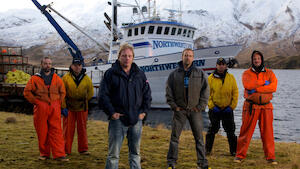
Fishing may be the world’s second oldest profession, but the industry is about as visible as a quiet cousin at a family reunion. Unassuming, keeping to itself, it is largely ignored in talk about work and the economy. All of which belies its oddly large footprint in reality TV.
Some of these “fishing industry” shows look at huge, highly capitalized and often nationalized factory fishing fleets. But most usually focus on much smaller, community and family-based single-owner boat crews that are part of a local fleet. That’s what we see in Discovery/Original Productions’s Deadliest Catch, which has long been the gorilla in the room. On the other end of the spectrum lies a series showcasing practices closer to sport-fishing, National Geographic’s Wicked Tuna. In between are Swords: Life on the Line and Lobstermen (in various iterations asLobstermen: Jeopardy at Sea, Lobster Wars, Lobstermen: Deadliest Catch in the UK), the British series Trawlermen, and various others. Most of these shows rely on the same basic motifs: dangerous seas, seafood as hidden treasure, competition between boats.
All of which raises two questions: 1) why are fishing shows so popular? and 2) how well do they portray their subject and its workers? One answer actually addresses both: they do a pretty good job of portraying individuals struggling with a job that is not only among the oldest but also the most dangerous. Yet that is also why this genre is itself a bit dangerous. Bringing the working world of the fishing industry to the general public performs a useful service. Doing so by emphasizing individualistic drama while soft-peddling the industry’s complex socioeconomic structures does not.
The push for drama is embodied in Discovery Channel’s description of its most long-lived and popular show, Deadliest Catch:
It’s the deadliest job on earth: crab fishing off the Alaska coast on the icy Bering Sea, home of the most violent waters on earth. During each crabbing season, a handful of adventurers will battle Arctic weather, brutal waves, and a ticking clock for a chance at big money in this modern day gold rush. Working around the clock, and often going days without sleep, this unique breed of men, part adventurer part fisherman, will set out upon an unforgettable odyssey.
As the last word suggests, this series is ‘epic,’ with all the sociocultural mythos attending it. Central to that mythos? Western masculinity and its time-honored themes: competition, violence, death.
This emphasis underpins a format that Discovery has recreated in its East Coast variation, Lobstermen. Even the opening language follows the formula: “The North Atlantic Ocean, one of the most treacherous regions of the open seas. Here a handful of brave men search for New England’s great-clawed beast: lobster.” Unfortunately, Lobstermen suffers in comparison, given its smaller boats, smaller crews, smaller traps, and smaller catch. It’s difficult not to smile at the hype: “great clawed beast”? Clearly, size matters.
The basic structures and themes appear even in a more divergent example, Swords: Life on the Line, which includes racially diverse crews and female captain Linda Greenlaw (herself an audience draw, being well-known from Sebastian Junger’s non-fiction drama Perfect Storm as well as her own The Hungry Ocean). But while such factors temper the show’s attachment to Anglo masculinity, they do not eliminate it.
To be fair, most of these series actually do manage to provide brief insights into larger systemic structures affecting fishing-industry workers. Much of the emphasis is on the captains who, even if they do not own their boats, are both management and labor. And the pay scale reflects the on-board hierarchy, with the value of labor decreasing from captain to first mate, and so on down the line. At the same time, captains face their own structural difficulties within a competitive capitalist system. Even if they own their boats, many captains are effectively “boat-poor” and regularly on the edge of financial and its related psychological collapse.
Read the rest of this piece at Working-Class Perspectives.
James V. Catano is producer/director of Enduring Legacy: Louisiana’s Croatian Americans and author of Ragged Dicks: Masculinity, Steel, and the Rhetoric of the Self-Made Man. He is Professor Emeritus of English and Screen Arts at Louisiana State University.












